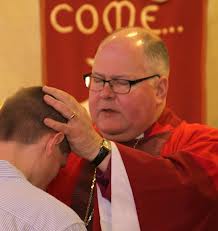
Confirmation
Because so many Episcopalians were baptized as small children, at some point we invite young people to choose whether or not they will renew (and make their own) the baptismal promises made on their behalf. Parents, grandparents, and the congregation continues to support young people. But the choice is entirely theirs. This appropriately happens at different ages, but generally after the age of 13, and always when the sponsoring priest and young adult agree that this is a mature, independent choice. Older adults participate in confirmation as well, again as an expression of a mature adult faith decision.
A person prepares for confirmation by a season as a “confirmand.” They should be a member of the parish. They need to attend a confirmation preparation class of ten or more sessions, informing people about the faith, liturgy, history, governance of the church and inviting them to explore their own faith practices, understanding the worship of some other Christians, and exploring parish ministries that might suit them.
On the day of Confirmation, the Diocesan Bishop comes to our church to hear the confirmands’ commitment and to pray for them, by laying hands on their heads. The Bishop asks God to strengthen the confirmands’ faith, empower them for service and sustain them all the days of their lives.
After confirmation a young person (older than 16) has a vote in the church congregation, and a somewhat older person who has been baptized, and received or confirmed, may serve as a leader if he or she is nominated and elected by the parish.
Because so many Episcopalians were baptized as small children, at some point we invite young people to choose whether or not they will renew (and make their own) the baptismal promises made on their behalf. Parents, grandparents, and the congregation continues to support young people. But the choice is entirely theirs. This appropriately happens at different ages, but generally after the age of 13, and always when the sponsoring priest and young adult agree that this is a mature, independent choice. Older adults participate in confirmation as well, again as an expression of a mature adult faith decision.
A person prepares for confirmation by a season as a “confirmand.” They should be a member of the parish. They need to attend a confirmation preparation class of ten or more sessions, informing people about the faith, liturgy, history, governance of the church and inviting them to explore their own faith practices, understanding the worship of some other Christians, and exploring parish ministries that might suit them.
On the day of Confirmation, the Diocesan Bishop comes to our church to hear the confirmands’ commitment and to pray for them, by laying hands on their heads. The Bishop asks God to strengthen the confirmands’ faith, empower them for service and sustain them all the days of their lives.
After confirmation a young person (older than 16) has a vote in the church congregation, and a somewhat older person who has been baptized, and received or confirmed, may serve as a leader if he or she is nominated and elected by the parish.